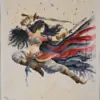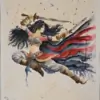
First Runner-Up in the 2000 Words Contest
Shadows of Betrayal
In the sweltering heat of an Agra summer, Jalal stood in his khwabgah. His eyes fixed on a weathered parchment in his hand. He was waiting for Jodha Begum. The letter that had been delivered to him by a messenger from Delhi had shaken him to his core. The letters on the parchment blurred before his eyes. It was unmistakable the handwriting of his father. The artistic calligraphy brought back memories of days long gone when his father tried in vain to teach him the art of reading and writing. The rustling of fabric made him raise his eyes and he saw Jodha Begum rushing towards him.
“Shahenshah, what happens? Bad messages? I was told that a messenger came from Delhi.”
“You heard it right! He brought a letter from the past.”
He looked at him questioningly.
“Delbaram," his voice low and urgent, "I need your eyes and your discretion. This letter... it's from my father."
He held out the letter to her.
“It was found in the library in Sher Mandal. A scribe found it hidden behind a loose stone when taking inventory of the books. They immediately send it to me, when they read who the letter was addressed to.”
Jodha's eyes widened as she took the parchment. She concentrated on the intertwined letters, and she began to read. As she read, her expression grew grave. "Shahenshah," she whispered, "this is no ordinary letter. Your… your father's death... it was no accident."
Jalal's face paled and his mind raced. The official story of Humayun's death, a fatal fall down the library stairs, had never sat right with him. Now, his suspicions were confirmed in the most shocking way possible.
“Can you read it out to me?”
Jodha took his hand and led him to the bed. Both sat down and he laid his head in her lap. Jodha caressed his hair and began to read.
Bismillah-ir-Rahman-ir-Rahim
“To my beloved son, Jalal-ud-Din Muhammad Akbar, future Padshah of Hindustan,
If this letter reaches your hands, it means fate has struck me down before I could speak these words to you myself. Know that as I write, my heart carries the weight of both love and worry for you and the empire we cherish. I see in you the makings of a ruler greater than I, one who shall unite the land not by the sword but by wisdom and justice.
But my son, beware, for the road ahead is treacherous. There are whispers in my court, shadows that move in the corridors of power. Those who once pledged loyalty now scheme against the throne. They abhor our efforts to bring together the disparate hearts of this empire. They fear the light of tolerance that we seek to cast upon all faiths and peoples.
I have not yet unravelled the full web of this conspiracy, but I am certain of its existence. A cabal of high-ranking nobles conspires against me, led by one whom I can name only as ‘Shahin’. This person cloaks themselves in power and cunning, and though their face is hidden, their talons are sharp.
I fear the day approaches when their ambition will strike me down. Should I fall—not by Allah’s will but by the design of men—know this: my death will be no accident. Guard yourself against these forces, for they are serpents in the guise of friends.”
Jalals jaw clenched. Jodha stopped reading and patted his head reassuringly.
“Read further, Delbaram!” he uttered with supressed voice.
“Above all, my son, do not allow their venom to deter you from the path we have charted. The strength of an empire lies not in division but in harmony. Build bridges where others would dig trenches and let the banners of Hindustan fly above a realm where all are equal in the sight of justice.
Jodha stopped again. The ornate writing was indistinct, as if hastily thrown onto the page.
„Why do you stop again?” Jalal frowned.
“The writing, it becomes indistinct, as if he had been in a hurry. Maybe…” she whispered in a choked voice, “maybe he felt, the traitors were near.”
Jalal swallowed hard as he thought about her words. Had his father written this shortly before his demise? Before the traitors shamelessly assassinated him? Jodha caressed his cheek and began to read further.
“I entrust you, Jalal, to continue what I have begun. You are my pride, my hope, and the future of this empire. Do not let fear cloud your judgment, but tread carefully, for even the brightest sun casts shadows.
May Allah guide you and protect you, always.
Your father, Nasir ud-din Muhammad Humayun”
"There's a conspiracy, led by someone called 'Shahin'.” Jodha concluded. “Your father couldn't identify all the conspirators, but he warns you to be cautious of those closest to you."
Jalal's fists clenched. "We must investigate this quietly. The conspirators could still be in our court."
“You´re right! Let´s think about how we can find out his identity.”
“But we have to be discreet. We don't want anyone to get suspicious.” Jalal replied thoughtful.
Over the next few weeks, Jalal and Jodha worked together to uncover the truth. They involved Abul Fazl, Birbal and Todar Mal in their investigations. They pored over court records, questioned loyal servants, and observed the nobles with newfound suspicion. All the while, Jalal maintained his usual routines, not wanting to alert anyone to the investigation.
During one of their nightly discussions, Jodha mused, "It's ironic, isn't it? Your father's progressive ideas led to his downfall, and now you're carrying that torch even further."
Jalal nodded solemnly. His policies of religious tolerance and cultural integration had indeed ruffled many feathers. The Din-i-Ilahi, his attempt at a syncretic religion, had particularly angered orthodox Muslims.
As they digged deeper into the investigation, a pattern began to emerge. Several nobles who had opposed Humayun's Persian alliances were now subtly undermining Jalal's policies. Among them, one stood out. His recent actions had been particularly suspicious.
One evening, as Jalal listened to the recitation of court records, a memory stirred. He recalled a noble’s vehement opposition to the abolition of the jizya tax on non-Muslims. Could he be 'Shahin'?
Jodha, ever observant, noticed Jalal's change in demeanor. As they were in his khwabgah after the hearing, she asked him cautious.
"What is it, Shahenshah? What are you thinking about?”
“Do you remember, when I called for the abolition of the jizya tax?”
“Haan. What do you mean?”
“Some of the nobles and courtiers were strictly against the abolition of the tax.”
“Haan! They feared the loss of money in the state coffers!”
“Exactly! Do you remember the opponents?”
“Not exactly their names. But weren't they supporters of your father's Persian alliance with Shah Tahmasp?” Jodha frowned.
Jalal shared his suspicions, and together they formulated a plan to expose the traitor.
The following week, Jalal announced a grand jashn to celebrate the completion of Fatehpur Sikri. As the nobles gathered, tension hung in the air. Jalal, seated on his throne, began to speak.
"My loyal subjects," he began, his voice carrying across the hall, "today we celebrate not just a new city, but a new era of unity and tolerance."
As he spoke, Jalal's eyes scanned the crowd, noting the reactions of each noble. When he mentioned his father's vision of a unified Hindustan, he saw the face of a certain person twitch with barely concealed disdain.
Suddenly, Jalal changed tack.
"But unity cannot exist where treachery lurks. I speak of a plot against my father, Emperor Humayun, orchestrated by one known as 'Shahin'."
Some of those present looked at each other questioningly, but a wave of shock went through a few of them. One face paled visibly and his gaze became unsteady.
Jalal continued, his voice growing stronger.
"Let me tell you a story!” His sharp gaze lingered over the assembled.
“A man was sitting in his quiet library. He knew, there was a conspiracy in his court. But despite thorough research, he couldn't find out who was behind it. He felt the noose tightening more and more and feared an attack on his life. He decided to write a letter. In which he warned of the conspiracy and did not rule out murdering him. Suddenly, disturbing noises reached his ears. He began to write hastily to preserve his suspicions for posterity! He finished his letter in a great hurry and with a last effort managed to hide it in the wall of his library.”
The courtiers looked at each other. What did their emperor want to achieve with this story? The fright that had gripped the limbs of a few had given way to sheer fear. Jalal's eyes had not missed the emotions. He continued in a louder voice.
“Let me tell you how the story continues!” he paused for a moment.
“The man left his library to see what the noises meant. These should have been his last thoughts before he faced his henchmen, who mercilessly beat him down and pushed him down the stairs!”
A pindrop silence spread among those present. Recognition dawned on the faces of the courtiers. As he spoke, Jalal gestured subtly to his guards. They moved silently through the crowd, positioning themselves near a certain group of nobles. Jalal began to narrate further.
“As most people will have correctly recognized, it was Jannat-Ashyani Nasir ud-din Muhammad Humayun, my late father!” With every word his voice got louder. “It wasn't an accident, it was cold-blooded murder! And this conspiracy did not end with my father's death. It continues to this day, threatening the very fabric of our empire."
"The time has come for 'Shahin' to reveal himself," Jalal roared. "Step forward now, and you may yet find mercy."
For a moment, silence reigned. No one moved. Then, with a scream of rage, Ali Quli Khan drew his sword.
"You fool!" he roared. " Your father's liberal ways would have destroyed us! And now you... you would have us bow to yours!"
The guards pounced, quickly disarming and restraining the traitor. As Ali Quli Khan was led away, Jalal addressed the stunned assembly.
"He wrote this letter to his beloved son. The Jahanpanah Jalal-ud-Din Muhammad. The Almighty in his kind mercy brought the letter into my hands to fulfill my father's legacy and punish the guilty. Let this be a lesson to all who would put their own prejudices above the good of the empire. Our strength lies in our diversity, in the tapestry of cultures and faiths that make up Hindustan."
With this words, he left the court, left behind a stunned assembly.
In the days that followed, Birbal and Todar Mal worked tirelessly to root out the remaining conspirators. The emperor's resolve to continue his policies of tolerance and integration only grew stronger.
As Jalal and Jodha stood on the balcony of his khwabgah, overlooking the lazily flowing Yamuna River, Jodha turned to him.
"You've done your father proud, Shahenshah. You've not only avenged him but carried his vision even further."
Jalal smiled, his eyes distant.
"And yet, there is still so much to do. The path of tolerance is never easy, but it is the only way forward."
By the dwindling light of the sunset, casting a golden glow across the river, Jalal felt a sense of peace. He pulled Jodha close and kissed her forehead lovingly.
“Your loyalty means the world to me, Jodha Begum. Together we can face the whole world." He pulled her even closer and smiled at her blushing face.
"Delbaram, would you spend the night with me?" with husky voice he whispered in her ear.





































100